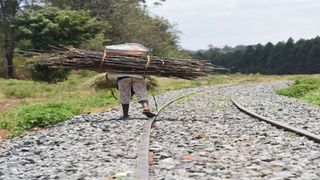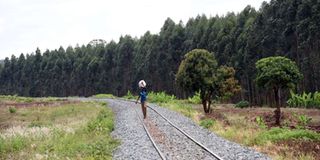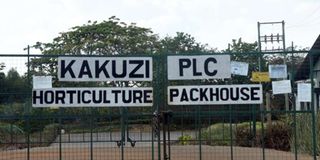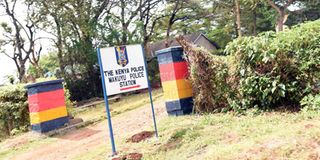
Girls carry firewood from Kakuzi PLC tree plantation in Makuyu, Murang’a County, on October 14.Kakuzi is facing human rights abuse allegations.
| Evans Habil | Nation Media GroupNews
Premium
Tales from hell: For the guards at Kakuzi, it’s ‘sex-for-firewood’
For several months leading up to September, Sarah had noticed a disturbing pattern with her 14-year-old daughter’s visits to a section of the Kakuzi plantation in Gateya, Murang’a County.
Whenever the girl returned from the forested area locals have nicknamed Gachangi, she would have leaves and twigs all over her clothes and hair.
The teenager was epileptic and the mother of two, concerned about her safety, persuaded her to avoid the risky place. Gachangi is part of the 42,000-acre Kakuzi plantation patrolled by ruthless guards.
Residents caught trespassing in the vast plantation of avocadoes have horrific tales. Two age-sets usually stroll into the plantations to collect firewood, mostly girls aged 13-20 years and older women.

A boy walking on along a railway line next to Kakuzi's tree plantation.
Sarah had heard vile stories of sexual assault by the guards, which explained her apprehension whenever she saw her daughter dishevelled. “Whenever I would ask, she would say she had to run from guards while collecting firewood in Gachangi,” Sarah told the Nation in an interview.
It wouldn’t be long before the dark secret was out. On September 21, Fredrick Omondi Otieno, a guard, was arrested following a complaint against him over an illicit relationship with the teenager.
The girl identified him as the one who had been defiling her for months. She was pregnant. Two weeks earlier, the girl’s step-father had also been arrested.
The two denied charges of defilement and their trial is scheduled at Kigumo Law Courts.
The Nairobi Securities Exchange-listed company is facing grave allegations of human rights abuses after a group of 79 Kenyans sued the majority shareholder, Camellia PLC, in the UK for failing to stop the alleged violations on Kakuzi’s plantation in Murang’a.
UK supermarket chain, Tesco, has suspended orders for avocadoes from Kakuzi over human rights concerns. Two years ago, a man died under controversial circumstances at the Rwanda section of the plantation amid claims he had been assaulted by the guards.
The firm has since erected an electric fence to close off the area where Joseph Maina Ndung’u, 28, was assaulted and later died of his injuries. Residents of Gateya allege other bodies have been retrieved from the forest before.
“Gateya is generally a safe place. We have never heard of people being killed elsewhere and their bodies being dumped in the forest. In any event, those recovered from Kakuzi forests have often turned out to be Makuyu residents,” a Gateya resident told the Nation.

The entrance to Kakuzi offices in Murang'a County on October 14, 2020.
Risky trips
Of the three dreaded sections of the plantation, Don Bosco is less dangerous, where girls and young women from neighbouring communities make the risky trips in search of firewood.
For a long time, women and girls from Gateya have become accustomed to this routine, but it’s one they would rather avoid if they had a choice. Behind Kakuzi’s kei apple fence, inside the blue gum trees and avocado farms, is a thriving sex-for-firewood trade that exploits teenage girls.
When a group of girls bump into the guards, those familiar with them will — as if on cue — walk to a bushy area. There, the guards will do their thing and the group will be allowed to collect firewood.
“Some of them will ask for a bribe, between Sh1,500 and Sh2,000, especially from the older women. But it has become common for some girls to trade sex for firewood. They do it because it allows them to come back any other day to collect more,” one of the residents said.

Elderly women walk past Makuyu Community and Education hall in Murang'a County on October 15, 2020.
Internal investigation
Following Omondi’s arrest, Kakuzi suspended him on September 21 and opened an internal investigation.
“You must supply the company with a contact telephone number where you can be contacted during working hours whilst you are on suspension. For this reason, you should be available during working hours to be contacted, as your suspension is with pay,” reads his suspension letter.
“You are to report to Forestry West Athara office at 0800hrs to the last day of your suspension when a formal disciplinary enquiry will be conducted.”
The teenager was taken to a children’s home and Sarah, who’s battling hypertension, is now trying to track down her daughter. She is bitter with some neighbours who knew about her daughter’s affair with Omondi but kept silent.
Interetingly, Omondi was also Sarah’s friend, whom she calls Freddy.
“Freddy would come to my house when off duty or on leave and check on me. If I was not, he would walk towards Gachangi and my daughter would soon leave in the same direction. I asked the neighbours why they did not inform me about this earlier. Now, when my daughter is pregnant is when they tell me. How does it help?” posed Sarah.
No justice
On the day we visited the plantation, on a narrow murram road that leads to Rwanda Forest, there were several patches along the kei apple fence that residents use to access Kakuzi land.
Two boys appeared on a route cutting through a blue gum forest on the left near Thangira village. They both carried folded sacks, probably stuffed with maize.
On the opposite side, two women carried harvested grass and a girl lugged firewood (dried blue gum tree branches). On spotting us, they dropped their luggage and were about to take off when they identified our guide.
“If they see me, they will not run away. If it were you alone, they would have run to the farms for fear of being arrested or assaulted,” a resident who took us on a tour of the dreaded sections of the plantation said.
Our visit to villages neighbouring the Kakuzi farms revealed that residents long gave up ever getting justice for the atrocities visited on them and have come to accept the brutality as a way of life.
“If you don’t have money. What will you do? They have captured everyone in authority: the police, the chief and others are on their side,” a resident said.
We encountered Mr Njau*, who worked at Kakuzi as a driver. He was allegedly fired alongside 190 colleagues in 2015. He had worked at Kakuzi for nine years and was on a permanent contract.
“One morning we went to the management to seek a response on why we had gone for two years without a salary increment, which was against our terms with the union. Instead of addressing our grievances, they called the police on us. We were beaten up and tear-gassed,” he claimed.
That was his last day at work and he would later find his dismissal letter in his compound. He claimed the group had never been paid their dues. Some died awaiting payment, others lost hope in the case ever being determined.
“We are always required to contribute money when there are hearings or sittings for the case. Several lawyers have taken our money and deserted us,” another former worker said.
Mr Njau claimed he had also been a victim of the brutal attacks by guards. “I was assaulted when I was found with a brooding facility at the farm,” he said.
Mr Njau is part of a group of 300 workers who were dismissed for participating in an unprotected strikes.
For Ndung’u’s family, June 2, 2018, set off events that would end up in his burial. In their police statements, two Kakuzi guards — Stanley Kinuthia and Evans Mutinda — claimed Ndung’u panicked when he saw them and fell off an avocado tree.
They alleged there were two bags of avocados on the ground. The guards took a seriously injured Ndung’u to Makuyu police station where they reported the incident.

A sign post at the entrance of Makuyu Police Station in Murang'a County on October 15, 2020.
Drove to hospital
He was bleeding profusely. The officers refused to take him into custody and insisted that he be rushed to hospital.
The officers did, however, file an incident report under occurrence book number 29/2/6/2018.
Mr Kinuthia and Mr Mutinda reportedly drove Ndung’u to Makuyu Health Centre but medics there said he needed specialised treatment. They drove to Maragua Level Four hospital past 1am, but he never made it.
A postmortem by government pathologist Johansen Oduor and an independent doctor hired by human rights groups led by activist Swaleh Githinji made shocking findings.
The autopsy confirmed that Ndung’u died from trauma, suggesting a blow to the head with a blunt object. Nobody was ever charged and two years later, Makuyu police said they were still investigating the matter. The two gaurds were later fired.
In March, the Director of Public Prosecutions (DPP) Noordin Haji ordered an inquest into Ndung’u’s death. These are not isolated incidents, residents say. There are allegations that at least 12 women have been raped while collecting firewood.
"Kakuzi settled the civil matter with the father based on the Courts direction. Through Kaplan & Stratton Kakuzi also wrote to the office of the DPP requesting an inquest be carried to establish the facts surrounding the tragic case. In January 2020, they followed up with the office with a request to expedite this matter. This matter sits with the office of the DPP,” said the company.
Locals say they are hapless as they are silenced whenever they attempt to speak out about the ills perpetrated by the multinational’s employees.
Many Gateya residents are ordinary Kenyans who depend on small-scale businesses or part-time jobs to put food on the table.
Makuyu chief, Esther Wangeci, said although she had heard allegations of assault in the plantations, no case has ever been reported to her office.
“Kakuzi management always handles such matters privately. No case has been reported to my office,” she said.
Kakuzi says it takes the out-of-court route only with victims who are willing, under its sexual harassment awareness reporting and prevention (Sharp) programme. The firm added that grave cases are forwarded to the police, and that where victims have been traumatised, it provides a counsellor at no cost.
Relevant authorities
“We take any allegations extremely seriously and given the nature of the offense and for the protection of the victim reporting, the company ensures independent free legal advice and if necessary a professional counselor who is a member of the Kenya Association of Professional Counselors is hired to handle the psychological trauma that the claimant may be going through and to provide support while reporting the matter to the authorities.
“Anonymity is ensured as investigations are carried out. We have settled several cases through this method,” Kakuzi said.
And for the first time, Kakuzi has acknowledged some of the violations. Kakuzi corporate affairs manager, Wilson Odiyo, told the Nation in October that the company acknowledges the multiple complaints of rights abuses against its guards.
“Kakuzi has a zero tolerance policy on any form of corruption and the community are free to report issues without interference and there is a record of this happening over the 50+ years that they have been operating," said Mr Odiyo.
“First, Kakuzi apologises to all the stakeholders about the recent happenings. Our business operations are strongly interlinked to the community we operate and live in and our business cannot exist without them. We are deeply disheartened about the horrible experiences as reported by a section of our community,” Dr Odiyo said.
“We are committed to working closely with the community and relevant authorities to ensure these matters are investigated and addressed. We recognise that although we have implemented many measures to address human rights issues in the past we still need to do more. We are currently reviewing a human rights action plan that will form part of our strategy going forward,” he added.
Rights violations
But in an earlier interview with a local TV station, Kakuzi had insisted that the rape, assault and murder claims on its plantation were part of a smear campaign to undermine its business.
Dr Odiyo had told the station that the company is unaware of any human rights violations by its guards. “A lot of them (human rights violations) remain unclear to us, they are unknown to us. Even today, if the people decided to speak about any of this to Kakuzi, Kakuzi would be more than willing to discuss these issues,” Dr Odiyo said.
The firm also published a statement insisting that most of the claims made in the UK court papers have never been reported to it or local police, and that the legal action is an unfair assault on its operations.
The company now says that it will stop sending guards to patrol areas bordering villages, and instead rely on police to protect its avocados and other agricultural produce in such areas.
As a step towards mending fences with the local communities, Kakuzi offered to give firewood for free to locals.
“We have increased our female guards from 8 to 35 and intend to have 50 per cent of them by year end. This way, we will have a gender balance in any team. We are discussing with third party security firms to operate in more sensitive areas to observe and report issues. We have made arrangements for free firewood for the community. This ensures no member of the community will be arrested for stealing firewood,” Dr Odiyo told the Nation.
Editor's Note: An earlier version of this story made reference to "vicious dogs". This has been deleted, after it was established that Kakuzi has never had dogs as part of its security. We apologise for the error.






